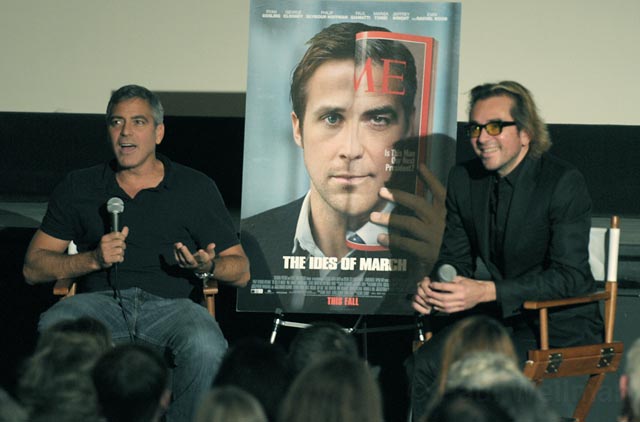George Clooney Gets Politically Dirty
Oscar-Winning Actor Discusses Directing The Ides of March

Though more known for being an Academy Award-winning actor, George Clooney also directs socially conscious and provocative films and is able to use his star power to get challenging projects off the ground. His latest, The Ides of March, is an adaptation of Beau Williamson’s political play Farragut North, about an idealistic young staffer who gets a taste of dirty politics while working on a presidential campaign. In addition to Clooney, who cast himself in the scene-stealing role of a governor running for president, the all-star cast features Ryan Gosling, Philip Seymour Hoffman, Marisa Tomei, and Paul Giamatti. The movie’s immediacy and skill recalls the classic films of Sidney Lumet. I sat down with Clooney last weekend to discuss his latest directing job.
Why did you change the title from the original name, Farragut North, to the more Shakespearean-sounding Ides of March? Well, we thought that Farragut North felt a little too Washington, D.C.-specific. The Ides of March is actually the 15th of March, when the primary takes place, and, obviously, there are some arguments about Cassius and Brutus, your best friend and your worst enemy, conspiring to kill you. The question you always sort of leave out there—you can decide who Caesar is, but we thought that there were bigger themes. The play was more specifically about the downfall of Stephen, and this we felt was much more of a morality play about what elements of your soul are you willing to sell and at what cost and if it’s worth it, and maybe it is. Maybe dirty campaigning, if the right guy gets in, is worth it. Those are conversations and discussions we wanted to have.
You added your character, Governor Mike Morris, and incorporated a scene that’s not in the play, which is the heart of the movie, where the two main characters face each other in the kitchen with their careers on the line. What inspired that? After we had gotten the play, that was the first scene that I wrote to adapt. I knew I wanted the governor in and I wanted to put him in jeopardy, so I wrote that scene, and then Grant Heslove and I wrote the screenplay backwards from that scene to sort of fill and get to that point. Once we knew we had that scene, we knew sort of what we wanted to do with the film.
Why was that scene so important for you? It brings together two characters who are really smart with their backs against the wall, both performing on all cylinders. You know both those guys are absolutely great at what they do, and neither of them is really backing down.
The other scene, too, that impressed me immensely was with Jennifer Ehle, who plays your wife, inside a car where the governor says he’s not going to compromise. Of course, later on, you see him compromising, just like Obama. My father ran for Congress in Kentucky — it’s not fun being a Democrat running for Congress in Kentucky, as you can imagine, and it didn’t turn out very well. He lost pretty badly. But that scene is a reflection of a conversation that I had with my father about running. It’s an odd thing running for Congress — even in a small district, it still costs you a couple million dollars. By the time you’re elected, you have to try and start getting reelected. And he was having a really difficult time. He wasn’t personally wealthy … so he was having a difficult time having to go and shake hands with people that he didn’t really particularly care for. When he first started, he couldn’t make any of those deals, and, as time went on, some of the lines were moved. Now, he didn’t give up his integrity along the way, and that’s probably the reason that he lost by the margin that he did, but somewhere along the way, there were certain things he did that he was really upset with himself about. He didn’t like the taste it left in his mouth, and I would suspect no politician can get through it without enjoying that taste.
The first half of the movie appeals to all the liberals and Democrats in us, where we have this very hopeful candidate bringing change, and then the second half is catnip for the Republicans, in which we have this Democrat who becomes corrupt. We like to sort of offend every side, you know. It’s funny—the very first time I talked about the movie, I said, “You know the Republicans will hate the first half, and the Democrats will hate the second half.” And then Amy Pascal, the Sony chief, goes, “Can you just say the Democrats will love the first half and the Republicans will love the second half? Phrase it a little differently.”
This movie raises many questions but doesn’t answer them. There’s so much ambiguity. Was that your intention? I like movies that get people to sit around and have discussions afterward. We didn’t want to make a polarizing film. I understand that, because of who I am, that sort of automatically happens, but we also knew that. We didn’t want to make a film about politics — I mean, I do say some fairly liberal things up there, but he’s a Democrat running in a Democratic primary, so you’re going to hear some liberal things. So that’s not inconsistent with what you would see in a Democratic primary. What we wanted to do was really focus on us and how we elect our officials and the processes that we go through and sort of pull it back to look at and understand the deals that we have to make and the plays we do to get there. And I thought that it was much more interesting to talk about a morality play than politics. I didn’t want it to be a civics lesson, since I’m not very good at it.
You were ready to film this movie a long time ago, before the Obama election, but you delayed it. Why? We had gotten the play in 2007 and adapted it, and we were in preproduction, and then President Obama was elected, and everyone was in such a good mood. It was 70 percent of the country, and the Republicans were like, “Ah, it’s okay.” Everyone was feeling so good that I was sitting with Grant at a restaurant in preproduction and we were working on the cast and we looked up and realized that we can’t make this movie now; everyone’s in too good a mood. And it took about a year. Bad for the country, but very good for filmmaking.
4•1•1
George Clooney directs and stars in The Ides of March, which comes to Santa Barbara theaters this weekend. See idesofmarch-movie.com.



